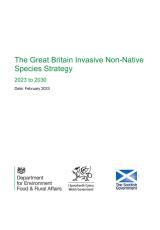How we plan to minimise the risks posed by invasive non-native species.
Documents

The Great Britain invasive non-native species strategy 2023 to 2030 , file type: PDF, file size: 3 MB
Details
Invasive non-native species (INNS) live in parts of the world they would not naturally be found and include:
- plants
- animals
- fungi
- micro-organisms
They can spread causing damage to the environment, the economy, our health or the way we live. The cost to the UK economy has been estimated nearly £1.9 billion a year.
The overarching aim of the strategy is to minimise the risk of introduction and establishment. Also to reduce the negative impacts of INNS in GB through a strong partnership approach. This strategy follows the CBD hierarchical approach.
This emphasises:
- prevention
- followed by early detection and rapid response
- and finally long-term management and control.
The key outcomes of the strategy by 2030 are:
Prevention
Reduce establishments of INNS by at least 50% compared to 2000 levels;
Surveillance, early detection and monitoring
Significantly improve our detection and monitoring capability, including increasing inspections and investigations.
Management
Eradicate, control or contain INNS – prioritised by greatest impact and the likelihood of success.
Prioritisation and risk analysis
Set out an agreed approach to the prioritisation of species based on risk and likelihood of success. This will ensure our efforts are focused to where they can achieve the greatest benefit.
Evidence
Commission the research priorities outlined in the Evidence Strategic Plan. This will ensure the strategy is based on the best available evidence. It will also identify gaps and priority areas for further development.
Awareness raising
Increase awareness of INNS issues and promote appropriate changes in behaviour or attitudes throughout all relevant sectors and the public.
Coordination
Improve co-ordination of actions within governments, associated bodies, and key actors outside government.
It covers 2023 to 2030.
